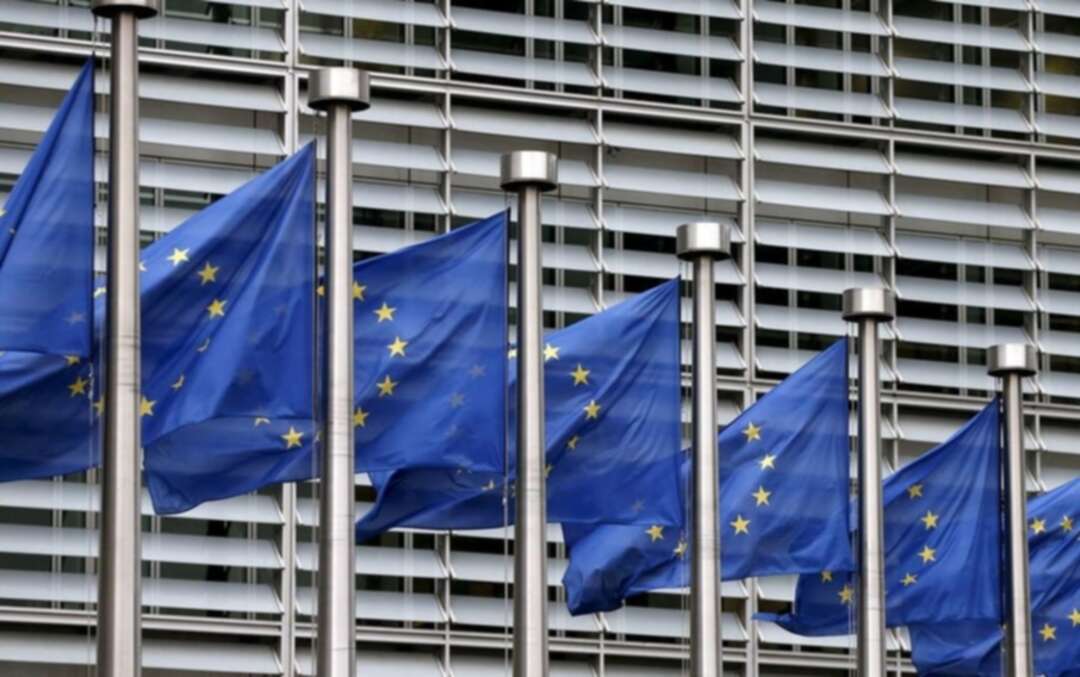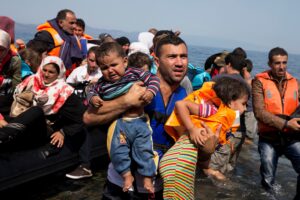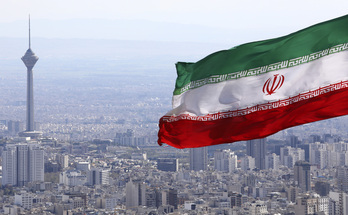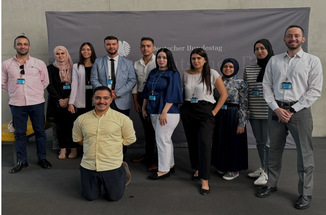-
Turkey Continues to Use Migration Card Against Europe

By Jassim Mohammed - Bonn
Illegal Migration Plagues European Union from Within
The shadow of the lack of consensus on how to tackle illegal migration still looms large over the European Union which has shown marked progress otherwise in building consensus on matters such as tackling the Brexit fallout, terrorism and extremism, the coronavirus pandemic and the risks in the eastern Mediterranean.
On March 12, 2021, the European Commission proposed in Brussels that the 27 European countries should draw up a list of countries from which immigrants originate in order to improve cooperation with them to take back their nationals, who have entered the EU illegally. The Commissioner for Home Affairs of the European Union, Ylva Johansson said that the bloc should intensify pressure on non-EU countries to take back migrants by threatening to change their visa policies.
She said that of out of half a million repatriation decisions in 2019 which are orders issued to migrants to leave the bloc, only between 140,000 and 150,000 people had actually been repatriated.
TURKEY-EU ASYLUM AGREEMENT CONTROVERSY
The asylum agreement signed between the European Union and Turkey in 2016 is still the subject of controversy. Some consider it an ineffective agreement and demand its cancellation while others demand that it be amended in order to face the refugee crisis. The agreement stipulates that Ankara will receive political and financial aid in return for dealing with illegal immigrants who seek to enter the countries of the Union through Turkey.
At the time, the agreement actually led to a relatively reduced number of migrants arriving in Europe and Turkey received the largest part of the 6 billion euros (15.7 billion dollars) allocated by the European Union in aid to Ankara under the agreement. Despite this, Ankara says that Brussels has not fulfilled its promises to ease conditions for granting entry visas to Turks and to expand the customs union between Turkey and the European Union.
Although the number of immigrants arriving in Europe has decreased significantly since the signing of the agreement, only 2,740 migrants have been returned to Turkey while European countries have received 28,621 immigrants from Turkey under the agreement, which is less than what had been promised.
The German government's deputy spokesman, Ulrike Demmer, said on March 17, 2021 that the two sides adhered to the agreement and implemented it together.
Cornelia Ernst, a member of the European Parliament for the Left Part, believes that the immigrant camps on the Greek islands are "a symbol of violations of basic rights."
A member of the European Parliament for the Green Party, Erik Marquardt, believes that the asylum agreement with Turkey "neglects human rights and that its success is measured by the isolation of Europe itself." Marquardt’s criticism is that that the agreement was reached by governments "without being discussed or passed in parliaments."
The asylum agreement between Ankara and Brussels was about to collapse in 2020 when thousands of illegal immigrants, most of them from Afghanistan, Pakistan and Iraq, gathered on the borders between Turkey and Greece. Ankara opened the borders to those seeking to enter Europe, but the migrant crisis stopped before it blew up, due to the outbreak of the coronavirus pandemic.
 Syrian refugees arrive aboard a dinghy after crossing from Turkey to the island of Lesbos, Greece. (File photo: AP)
Syrian refugees arrive aboard a dinghy after crossing from Turkey to the island of Lesbos, Greece. (File photo: AP)MIGRANTS AS BARGAINING CHIPS
Turkish President Recep Tayyip Erdogan uses the agreement to put pressure on the European Union, and has repeatedly threatened to open borders if Europe does not send more money.
Experts believe that the agreement now needs more funding and to extend to other groups of immigrants in Turkey, according to Sinem Adar, a researcher at the Center for Applied Turkish Studies at the German Institute for International and Security Affairs.
“Future program in this regard should also support the integration processes as most Syrians are likely to prefer to stay in Turkey,” Adar said.
Gerald Knau of the European Stability Initiative says that the immigration agreement between Turkey and the European Union will fail if it is not updated or another agreement reached instead. In a webinar organized by the Istanbul-based Immigration Research Association, Knau said that the European Union should increase aid to migrants in Turkey and start receiving more of them.
If this does not happen, Erdogan believes, Ankara could be tempted to allow migrants to cross its European borders and use that as a bargaining chip.
However, there are those who believe that the agreement will not survive for long, including Bano Butvara of the Evo Institute for Economic Research, who says that Ankara "has embarked on its latest military operations without consulting with its NATO allies, which raised the number of refugees."
The spokesman adds that in this context, it is not logical to expect the European Union to present Turkey with a blank check. If Europe wants to continue financial support to Turkey, then the latter should not repeat such military operations, he says.
The European Union is seeking to preserve the agreement with Turkey, in order to host approximately four million refugees in Syria.
On April 06, 2021, the President of the European Commission, Ursula von der Leyen, said that the Commission will present a proposal to Turkey soon to ensure the flow of funds to the refugees, adding that Europe wants "much better relations" with Ankara, but it is "still early."
During a visit to Ankara on April 06, 2021 to revive bilateral relations, the President of the European Council and President of the European Commission expressed to Turkish President Erdogan their concern about the situation of human rights in Turkey, stressing on the other hand the importance of partnership with it.
ASSESSMENT OF ILLEGAL MIGRATION WITHIN EUROPEAN UNION
The issue of illegal immigration has preceded the file of terrorism and extremism within the European Union and it has also come to the attention of the political class and the European street.
Europe is trying to curb immigration, by adopting funding for the voluntary return of migrants and investing in the local economic development of countries at home for migration, especially in West Africa.
As for the waves of migration from Syria and Iraq, it is trying to activate its agreement with Turkey signed in 2016, in order to reduce waves of migration.
1990: DUBLIN AGREEMENT
According to the Dublin Regulation for Refugees which was ratified by 12 member states of the European Union on June 15, 1990 and entered into force on September 1, 1997, asylum seekers can apply for asylum in only one country from the European Union. The Agreement stipulates that the asylum seeker in the European Union is subject to fingerprinting according to the Eurodac agreement. The fingerprints are then included in the data bank and through that their application for asylum can be tracked for duplication if applied in more than one European country. If such a violation is traced, then the asylum-seeker can be returned to the first country in which they took their fingerprints, preventing multiple asylum applications from one person inside Europe.
2015: DIVISIVE DEAL IN MANAGING REFUGEE INFLOW
In August 2015, the interior ministers of the European Union approved the redistribution of 160,000 asylum seekers throughout Europe, as part of a plan that is supposed to end in September 2017, under what is known as the “Refugee Distribution” agreement.
Its aim was to reduce the burden on some member states that showed sympathy with asylum seekers, including Germany, Sweden and Austria, and with countries that forcibly received a large number of refugees, being the gateway to the European Union, including Italy and Greece.
According to the agreement, Germany was to receive 31,443 refugees while France, Spain, Poland, the Netherlands, Romania, Belgium, Sweden, Austria, Portugal and Finland would receive 24031, 14931, 9287, 7214, 4646, 4564, 4469, 3640, 3074 and 2398, respectively.
The Czechs were obligated to receive 2,978 refugees while Bulgaria, Latvia, Slovenia, Malta and the southern part of Cyprus would receive 1600, 1502, 631, 1064, 133 and 274 refugees respectively.
If these countries adhere to the numbers, they were expected to receive material support from the European Union’s treasury, with a budget of 780 million euros.
2019: FRONTEX CHALLENGE OF CONTROLLING THE UNION'S EXTERNAL BORDERS
On October 9, 2019, the European Union and the Republic of Montenegro signed a cooperation agreement allowing the European Union Border Protection Agency, Frontex, to help Montenegro to manage its common borders with the countries of the Union in order to control immigration and the agreement was approved by the European Commission.
Frontex currently has more than 800 employees and an annual budget of about 450 million euros. The agency also intends to provide a number of personnel, helicopters, vehicles and equipment to secure the protection of the external borders of the European Union.
On May 4, 2020, Fabrice Leggeri, Executive Director of Frontex outlined the agency’s interest in combating terrorism and ensuring the safety of citizens on the move and that they need to constantly improve border security without making life more difficult for legitimate travelers.
EXTREME RIGHT INVESTING IN REFUGEE CRISIS
The European far-right seeks electoral gains by adopting anti-immigration rhetoric and is questioning the legitimacy of the European Union and its ability to face economic and security challenges.
The election results in Germany, the Netherlands and Austria gave the extreme right-wing parties hope for their coming to power and reshaping the political scene of the old continent.
In the upcoming Italian elections, the far-right Lega Nord has announced its intention to deport thousands of asylum seekers from Italy, as part of a radical scheme aimed at reshaping Italian asylum policy – an election promise (among other similar controversial assurances) that it hopes will help it to gain power and occupy part of the general political scene in his country.
As part of its electoral program, the party not only talked about stopping immigration, but rather promised its supporters that it would take judicial measures and procedures that make it difficult to obtain approval for asylum applications.
2020: EU PROJECT TO SHARE REFUGEE RECEPTION
In a new European Commission project discussed on September 23, 2020, solidarity will be mandatory between the countries of the Union in the event of pressure as a result of receiving refugees. Any member state will also be helped, especially by countries that have always avoided contributing to the process in setting out a "mandatory solidarity mechanism" among the member states of the Union.
This project comes after the continuous refusal of some countries of the Union, such as Poland, Hungary, the Czech Republic and Slovakia to receive asylum seekers, which led to the failure of the distribution of quotas to share the burden of refugees as decided after the refugee crisis in 2015. Countries like Greece, Malta and Italy bore the brunt of that crisis.
German Interior Minister Horst Seehofer said on July 7, 2020, during his country's presidency of the European Union, that it was "shameful" that the European Union had not yet found a solution to receive asylum seekers, after years of immigration crisis.
The minister made this criticism during a meeting of European interior ministers via video link while the 180 migrants on board the humanitarian ship Ocean Viking were eventually allowed to disembark in Sicily after nine days of waiting.
2020: A NEW IMMIGRATION MANAGEMENT SYSTEM?
On July 7, 2020, the Commissioner for Home Affairs of the European Union, Ylva Johansson, stated that the plan for the internal division of refugees and reform of the immigration system which was supposed to have been prepared in the last quarter of the same year, faced a considerable opposition and rejection by southern countries.
The Visegrad Group (Poland, Hungary, Czech Republic and Slovakia), which in its position has the support of Vienna, rejects the proposals of the European Commission while Rome and Athens, like the European Parliament, demands that the burden of reception be shared permanently and not in periods of crisis. This measure is good, but it is not sufficient.
This raises questions about the seriousness of these countries in overcoming the deepening crisis. The proposal of the document and pushing those of the 27 member states of the European Union, which are deeply divided, to agree on it, is the most important and challenging task for the European Commission.
The President of the European Commission, von der Leyen, announced on September 22, 2020, that she intends to cancel the "Dublin System", which requires that the first country that a migrant enters, consider the asylum application.
It will be replaced with a "new European immigration management system." She added that the system "will have joint structures around asylum and will have a new strong solidarity mechanism", which raised some skepticism as a group of EU countries are still sharply divided on this issue.
Important indications about burden-sharing mechanisms in the European Union can be found in the New Pact on Migration and Asylum of 2020. In this context, member states agreed to establish procedures, in the event of crises in one of the member states facing a large group of asylum seekers, to enable the secondment of employees from other member states to assist that country and to prove its effectiveness in solidarity with that country by mobilizing the existing programs of the European Union more quickly.
You May Also Like
Popular Posts
Caricature
Syrians' concerns now
- December 10, 2024
Syrians' concerns now #Syria
#Bashar_al-Assad
#Liberation_of_Syria
#Syrians
#Future_of_Syria
#Levant_News

opinion
Report
ads
Newsletter
Subscribe to our mailing list to get the new updates!




















